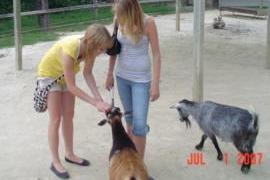In what seems to be two unrelated outbreaks of Q fever, five people fell ill in Washington and three in Michigan. The Washington outbreak was caused by infected goats – officials believe the pathogen infected the five people via contaminated dust particles.
Three women in Michigan fell ill after consuming raw cow milk from their dairy herd share program from a Livingston County farm.
Humans in general are at risk of zoonotic infection, but children (especially under the age of 5), pregnant women, the elderly, and immunocompromised people are at a  higher risk.
higher risk.
Q fever is not common; this is the first reported Michigan case in 20 years and the U.S. Centers for Disease Control reports that around 3 per cent of the healthy U.S. population and 10-20 per cent of persons in high-risk occupations (veterinarians, farmers, etc.) have antibodies to C. burnetii, suggesting past exposure. More frequent pathogens associated with animal-human contact and raw milk consumption are E. coli O157, Salmonella, Cryptosporidium and Campylobacter. For more info of the many types of zoonotic diseases that have been linked to animal-human contact outbreaks at petting zoos/farms, and raw milk consumption, visit our tables,
